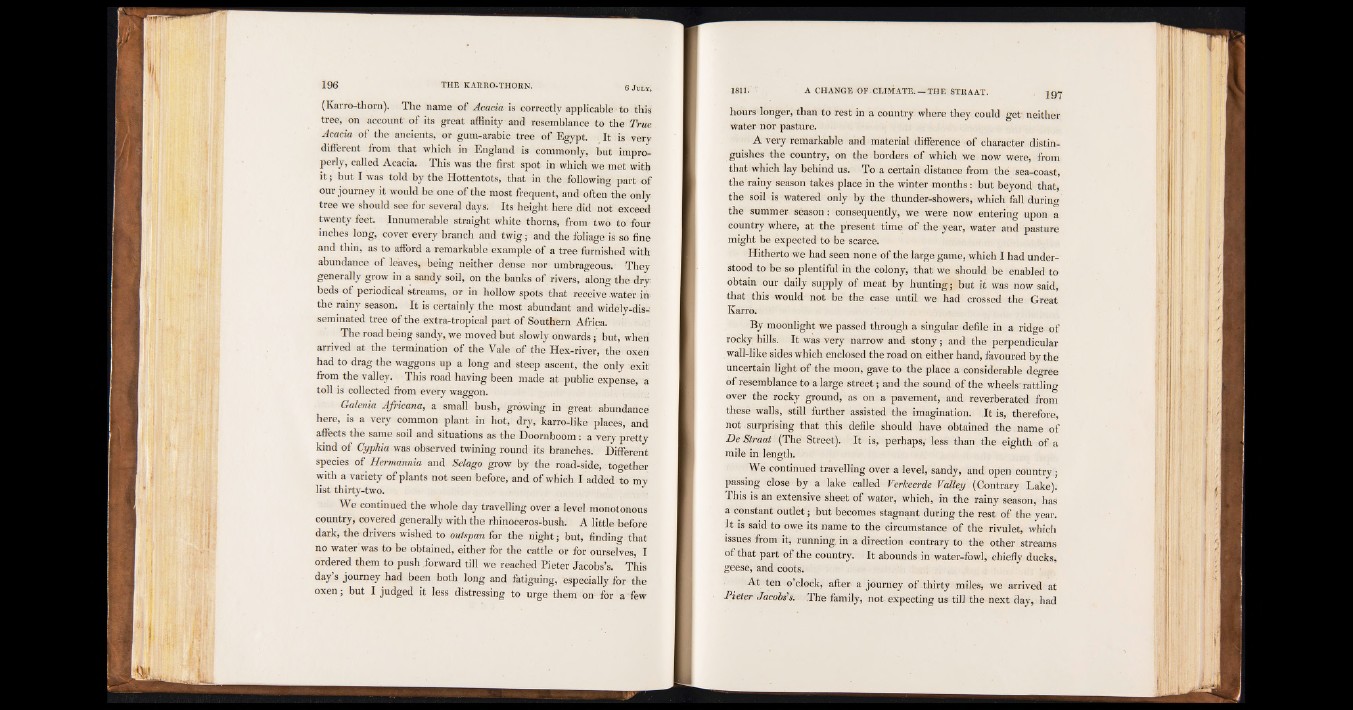
(Karro-thorn). The name of Acacia is correctly applicable to this
tree, on account' of its great affinity and resemblance to the True
Acacia of the ancients, or gum-arabic tree of Egypt. It is very
different from that which in England is commonly, but improperly,
called Acacia. This was the first spot in which we met with
i t ; but I was told by the Hottentots, that in the following part of
our journey it would be one of the most frequent, and often the only
tree we should see for several days: Its height here did not exceed
twenty feet Innumerable straight white thorns, from two to four
inches long, cover every branch and twig; and the foliage is so fine
and thin, as to aflbrd a remarkable example of a tree furnished with
abundance of leaves, being neither dense nor umbrageous. They
generally grow in a sandy soil, on the banks of rivers, along the dry:
beds of periodical streams, or in hollow spots that receive water ifr
the rainy season. It is certainly the most abundant and widely-disseminated
tree of the extra-tropical part of Southern Africa.
The road being sandy, we moved but slowly onwards; but, when
arrived at the termination of the Vale of the Hex-river, the oxen
had to drag the waggons up a long and steep ascent, the only exit
from the valley. This road having been made at public expense, a
toll is collected from every waggon.
Galenia Africana, a small bush, growing in great abundance
here, is a very common plant in hot, dry, karro-like places, and
affects the same soil and situations as the Doornboom: a very pretty
kind of Cyphia was observed twining round its branches. Different
species of Hermannia and Selago grow by the road-side, together
with a variety of plants not seen before, and of which I added to my
list thirty-two.
We continued the whole day travelling over a level monotonous
country, covered generally with the rhinoceros-bush. A little before
dark, the drivers wished to outspan for the night; but, finding that
no water was to be obtained, either for the cattle or for ourselves, I
ordered them to push forward till we reached Pieter Jacobs’s. This
s journey had been both long and fatiguing, especially for the
oxen; but I judged it less distressing to urge them on for a few
hours longer, than to rest in a country where they could get neither
water nor pasture.
A very remarkable and material difference of character distinguishes
the country, on the borders of which we now were, from
that which lay behind us. To a certain distance from the sea-coast,
the rainy season takes place in the winter months : but beyond that,
the soil is watered only by the thunder-showers, which fall during
the summer season: consequently, we were now entering upon a
country where, at the present time of the year, water and pasture
might be expected to be scarce.
Hitherto we had seen none of the large game, which I had understood
to be so plentiful in the colony, that we should be enabled to
obtain our daily supply of meat by hunting; but it was now said,
that this would not be the case until we had crossed the Great
Karro.
By moonlight we passed through a singular defile in a ridge of
rocky hills. It was very narrow and stony; and the perpendicular
wall-like sides which enclosed the road on either hand, favoured by the
uncertain light of the moon, gave to the place a considerable degree
of resemblance to a large street; and the sound of the wheels'rattling
over the rocky ground, as on a pavement, and reverberated from
these walls, still further assisted the imagination. I t is, therefore,
not surprising that this defile should have obtained the name of
De Straat (The Street). It is, perhaps, less than the eighth of a
mile in length.
We continued travelling over a level, sandy, and open country;
passing close by a lake called Verlceerde Valley (Contrary Lake).
This is an extensive sheet of water, which, in the rainy season, has
a constant outlet; but becomes stagnant during the rest of the year.
It is said to owe its name to the circumstance of the rivulet, which
issues from it, running, in a direction contrary to the other streams
of that part of the country. It abounds in water-fowl, chiefly ducks,
geese, and coots.
At ten o clock, after a journey of thirty miles, we arrived at
Pieter Jacobs’s. .The family, not expecting us till the next day, had